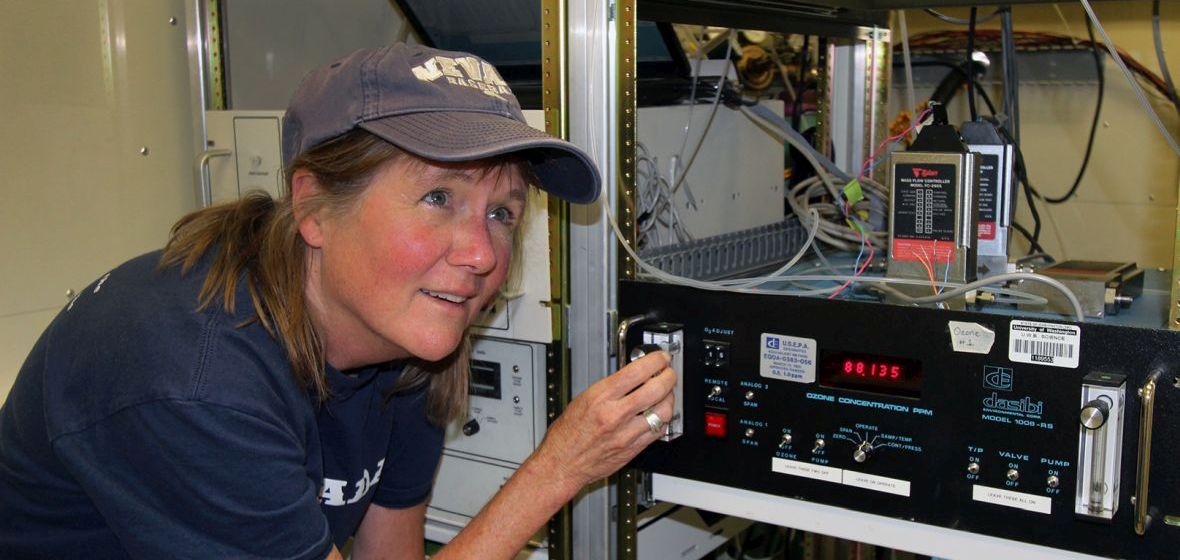Mae Gustin's research into the release, measurement and impact of mercury in the atmosphere was the subject of international attention in 2015. As a United Nations treaty – designed to protect human health and the environment from the release of harmful mercury compounds – was considered, scientists and scholars in many countries turned to work conducted by the University of Nevada, Reno researcher and her team.
This example of the significance and quality of Gustin's continued research is also an example of why the Foundation Professor in the College of Agriculture, Biotechnology and Natural Resources has been named the University's 2016 Outstanding Researcher.
Mercury inputs into the atmosphere worldwide have increased several-fold in the past 150 years and Gustin says this historic trend requires a dramatic shift in thinking regarding the scientific community's understanding of atmospheric mercury and in the means by which it is measured.
{{RelatedPrograms}}
Gustin, a faculty member in the Department of Natural Resources and Environmental Science, has been with the University since 1994. Her primary research interest is the study of inorganic contaminants in the environment. Her recent work focuses primarily on understanding the chemistry and environmental fate of atmospheric mercury, and the sources of ozone and other air pollutants.
While this work has worldwide implications, Gustin, her team and her NRES faculty colleagues also place considerable focus on Nevada and the West. Gustin recently managed the Nevada Rural Ozone Initiative, a large project that measured ozone and other air pollutants across the state of Nevada.
"Her work is consistently rooted in conceptual models that she develops when planning projects, is characterized by creative approaches to conducting experiments and consistently results in high profile publications," Bill Payne, dean of CABNR, wrote in his nomination of Gustin.
Gustin's research contributions, as outlined in her nomination, include:
- Publication of more than 140 peer-reviewed journal articles throughout her career. She or someone in her lab was first author on more than 70 percent of these articles.
- More than 190 presentations at national and international conferences worldwide, including more than 50 invited seminars and presentations.
- Scientific advancements in the detection and fate of mercury in atmospheric, terrestrial and aquatic environments.
- Leadership roles including service as a member of the National Academy of Sciences Committee on International Transport of Air Pollutants and member of the National Atmospheric Deposition Network Scientific Advisory Board.
- Service as a panel member at the National Science Foundation as an Associate Editor for the high impact journal Science of the Total Environment, and as a referee for more than seven of the most prominent journals in the environmental science field.
- Exemplary record of extramural research support including more than 40 awards with more than $4 million in funding originating from competitive sources.
- Supervision of 19 master-degree students, seven doctoral students and five postdoctoral follows who have gone on to establish important careers, plus mentorship of four to six undergraduate students at any time.
"Just as she is dedicated to quality, impactful research, Dr. Gustin is devoted to the professional development and future careers of her students," Marc Johnson, University president, said. "She is most deserving of this recognition."
"With science as her platform, Dr. Gustin has explored often controversial concepts," Mridul Gautam, the University's vice president of research and innovation, said. "She has advanced the understanding and science of atmospheric contaminants and has made a lasting contribution to an important field of environmental science."
Much of the funding of Gustin's work is from competitive federal programs and subject to peer review. Her research has received funding from the National Science Foundation, Department of Energy, Environmental Protection Agency, Electric Power Research Institute, Nevada Division of Environmental Protection and private industry.
Gustin earned her doctoral degree at the University of Arizona, her master's degree at the University of North Carolina, Chapel Hill and her bachelor's degree at Guilford College in Greensboro, North Carolina.
The University's Outstanding Researcher award has been presented annually since 1975. The honoree is selected by a committee of the five previous recipients and the honoree receives a $5,000 award.
Note: Whip Villarreal and Dr. Gustin's faculty page contributed to this story.












